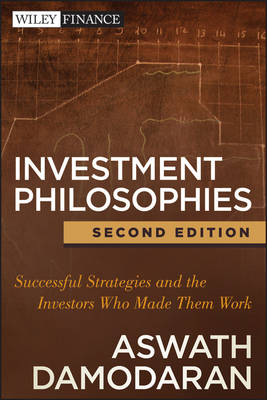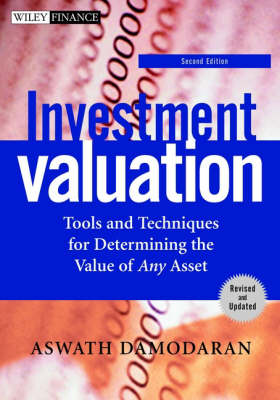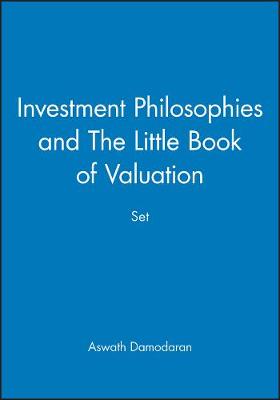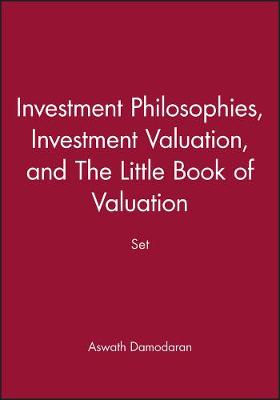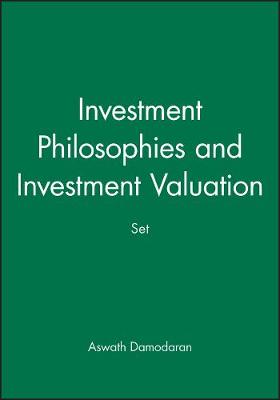Wiley Finance
3 primary works • 7 total works
Book 324
Damondaran on Valuation will not only convince you of the vitalityof the many valuation models available to you, it will help ensurethat you develop the acumen needed to select the right model forany valuation scenario.
Written by a gifted teacher and respected valuation authority, Damodaran on Valuation offers systematic examination of the threebasic approaches to valuation - discounted cash-flow valuation,relative valuation, and contingent claim valuation - and thevarious models within these broad categories.
Using numerous real-world examples involving both US andInternational firms, the book illuminates the purpose of eachparticular model, its advantages and limitatations, thestep-by-step process involved in putting the model to work, and thekinds of firms to which it is best applied. Among the toolspresented are designed to:
- Estimate the cost of equity - including the capital asset pricingmodel and arbitrage pricing model
- Estimate growth rates - with coverage of how to arrive at aweighted average of growth rates by blending three separateapproaches
- Value equity - focusing on the Gordon Growth Model and thetwo-and three-stage dividend discount model
- Measure free cash flow to equity - cash flows that are carefullydelineated from the dividends of most firms
- Value firms - including free cash flow to firm models, which areespecially suited to highly leveraged firms
- Estimate the value of assets by looking at the pricing ofcomparable assets - with insight into the use and misuse ofprice/earning and price/book value ratios, and underutilizedprice-to-sales ratios
- Measure the value of assets that share option characteristics -including a comparative look at the classic Black-Scholes andsimpler binomial models
Supported by an optional IBM-compatible disk, which consists ofspreadsheet programs designed to help users apply the modelshighlighted in the book, Damodaran on Valuation providespractitioners involved in securities analysis, portfoliomanagement, M&A, and corporate finance with the knowledge theyneed to value any asset.
Book 665
In doing this, Damodaran provides an unbiased forum for the presentation of different investment philosophies, while supplying the tools-the definition and measurement of risk, the notion of market efficiency and how to test for inefficiencies, and the components and determinants of trading costs-and the empirical evidence for readers to make their own judgments on the investment philosophy that fits their specific investment goals and views of how markets work. Filled with valuable insights and expert advice, this book reveals various investment philosophies to a general audience of investors, not purely to professional investors. Aswath Damodaran (New York, NY) is Professor of Finance at New York University's Leonard N. Stern School of Business. He is the author of Applied Corporate Finance (Wiley: 0-471-33042-6) and Investment Valuation (Wiley: 0-471-41488-3).
Book 666
The expanded coverage addresses: valuation of unconventional assets, financial service firms, start-ups, private companies, dot-coms, and many other traditionally valued assets; risk in foreign countries and how best to deal with it; using real option theory and option pricing models in valuing business and equity; the models used to value different types of assets and the elements of these models; how to choose the right model for any given asset valuation scenario; and, online real-time valuations that are continually updated. A perfect guide for those who need to know more about the tricky business of valuation, "Investment Valuation, Second Edition", will be a valuable asset for anyone learning about this critical part of the investment process.
Investment Philosophies, 2e & The Little Book of Valuation Set
by Aswath Damodaran
A two-book set featuring stock and investment guides with tips and tools
This book set is for anyone who wants a greater understanding of investment strategies and stock valuation. The set includes Investment Philosophies: Successful Strategies and the Investors Who Made Them Work and The Little Book of Valuation: How to Value a Company, Pick a Stock and Profit. Investment Philosophies presents key strategies, along with an examination of which ones tend to produce better results. Techniques covered range from indexing and analysis to growth investing and market timing. Smart portfolio development and management is also discussed. The The Little Book of Valuation covers the fundamentals of valuing and picking stocks, plus making better investment choices. Readers can learn how to navigate stock research reports and understand valuation approaches.
Investment Philosophies 2e, Investment Valuation 3e & The Little Book of Valuation Set
by Aswath Damodaran
A three-book set featuring stock and investment guides with tips and tools
This book set is for anyone who wants a greater understanding of investment strategies and stock valuation. The set includes Investment Philosophies: Successful Strategies and the Investors Who Made Them Work; Investment Valuation: Tools and Techniques for Determining the Value of Any Asset; and The Little Book of Valuation: How to Value a Company, Pick a Stock and Profit. Investment Philosophies presents key strategies, along with an examination of which ones tend to produce better results. Techniques covered range from indexing and analysis to growth investing and market timing. Smart portfolio development and management is also discussed. Investment valuation tools are the subject of another book in the set. It introduces professionals and students to a range of valuation models and their advantages or disadvantages. A third guide in the set covers the fundamentals of valuing and picking stocks, plus making better investment choices. Readers can learn how to navigate stock research reports and understand valuation approaches.
Investment Philosophies, 2e & Investment Valuation, 3e Set
by Aswath Damodaran

